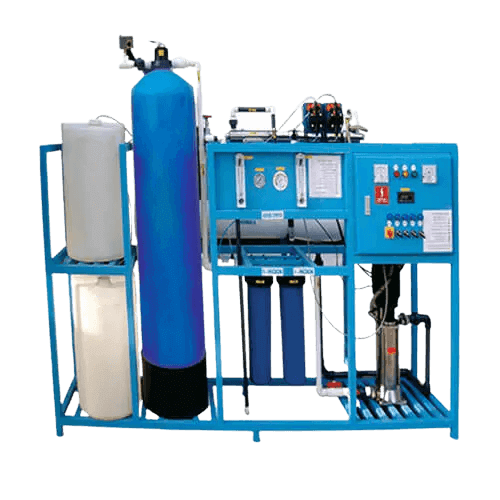RO Plant for Poultry
A reverse osmosis (RO) system for poultry is a water treatment system used to purify water used for poultry farming. The RO process removes impurities such as bacteria, viruses, dissolved salts and other particles from the water, making it safe for birds to drink.
RO equipment typically includes a series of filters, including a pre-filter, a sedimentation filter, and a carbon filter. These filters remove larger particles and impurities from the water. The water then passes through a semi-permeable membrane where the RO process takes place. The membrane allows only pure water molecules to pass through and at the same time blocks impurities.
The purified water is then stored in a storage tank and distributed to the poultry farm where the birds can drink. The impurities and wastewater that are removed from the RO process are usually discarded, although some systems may include a wastewater treatment component.
Overall, the use of RO equipment in a poultry farm can improve the health and welfare of the birds as well as increase the efficiency of the farm operation. It can also improve the quality of poultry products as the birds drink clean and safe water.
Working of RO Poultry Plant
Reverse osmosis (RO) is a process commonly used in poultry farms to purify water for various purposes such as drinking water for birds and cleaning equipment. The process involves the use of a semi-permeable membrane that is designed to remove impurities and dissolved solids from the water, leaving it clean and safe for use.
The first step in the RO process is water pretreatment. This can include the use of filters, sedimentation tanks and chemical treatment to remove larger particles and impurities from the water. Once the water is pre-treated, it passes through the RO membrane.
An RO membrane is a thin layer of material that is designed to allow only water molecules to pass through while trapping larger particles and dissolved solids. The water is forced through the membrane under high pressure, which helps to remove even the smallest impurities.
After passing through the RO membrane, the water then goes through a series of post-treatment processes. This may include adding chemicals such as chlorine to disinfect the water and ensure safe use. The water is also tested to ensure it meets the required quality and purity standards.
In the poultry house, the treated water is used for various purposes. It is used as drinking water for birds, helping to keep them healthy and hydrated. It is also used to clean equipment and facilities, helping to keep the environment clean and hygienic.
Overall, the RO process is an effective and efficient way to purify water in a poultry house. It ensures that the water is safe for use and meets the required standards of quality and cleanliness, which contributes to promoting the health and well-being of the birds and the overall operation of the facility.

RO Plant for Poultry
Advantages of RO Plant Poultry
Reverse osmosis (RO) systems are becoming increasingly popular in the poultry industry due to their many advantages. Here are some of the benefits of using RO equipment in Poultry Operations:
RO plants effectively remove impurities and contaminants from water and provide poultry with clean and safe drinking water. This can improve the overall health and well-being of the birds, leading to better growth and productivity.
RO plants are an efficient and cost-effective way of purifying water. They require minimal maintenance and have a long lifespan, making them a smart investment for poultry operations.
RO plants are designed to be energy efficient, meaning they use less energy than traditional water treatment methods. This can help reduce operating costs and minimize the environmental impact of poultry operations.
RO plants can be customized to meet the specific needs of different poultry operations. They can be designed to remove specific contaminants, handle different flow rates and operate at different pressures.
RO plants are easy to install and can be integrated into existing water systems. This makes it easier for poultry operations to upgrade their water treatment systems without disrupting their daily operations.
Overall, RO plants provide a number of benefits to poultry operations. They provide clean and safe drinking water for birds, are cost effective, energy efficient, customizable and easy to install. These benefits can lead to improved poultry health and productivity, ultimately leading to better profitability for poultry farmers.
Advantages of RO Plant Poultry
Reverse osmosis (RO) systems are becoming increasingly popular in the poultry industry due to their many advantages. Here are some of the benefits of using RO equipment in Poultry Operations:
RO plants effectively remove impurities and contaminants from water and provide poultry with clean and safe drinking water. This can improve the overall health and well-being of the birds, leading to better growth and productivity.
RO plants are an efficient and cost-effective way of purifying water. They require minimal maintenance and have a long lifespan, making them a smart investment for poultry operations.
RO plants are designed to be energy efficient, meaning they use less energy than traditional water treatment methods. This can help reduce operating costs and minimize the environmental impact of poultry operations.
RO plants can be customized to meet the specific needs of different poultry operations. They can be designed to remove specific contaminants, handle different flow rates and operate at different pressures.
RO plants are easy to install and can be integrated into existing water systems. This makes it easier for poultry operations to upgrade their water treatment systems without disrupting their daily operations.
Overall, RO plants provide a number of benefits to poultry operations. They provide clean and safe drinking water for birds, are cost effective, energy efficient, customizable and easy to install. These benefits can lead to improved poultry health and productivity, ultimately leading to better profitability for poultry farmers.
